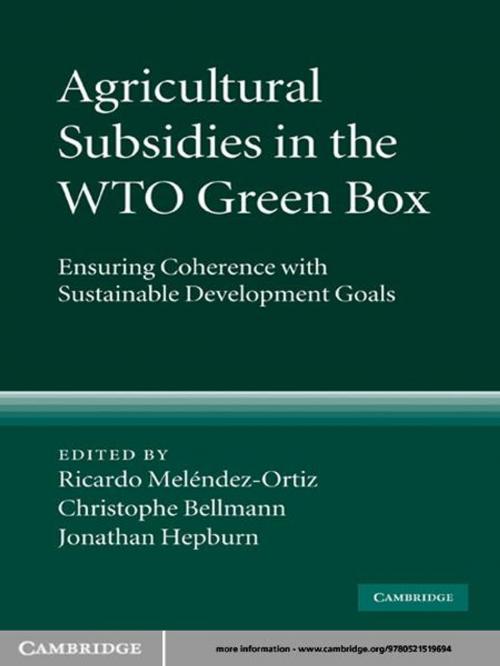Agricultural Subsidies in the WTO Green Box
Ensuring Coherence with Sustainable Development Goals
Nonfiction, Reference & Language, Law, International, Business & Finance| Author: | ISBN: | 9780511739040 | |
| Publisher: | Cambridge University Press | Publication: | December 3, 2009 |
| Imprint: | Cambridge University Press | Language: | English |
| Author: | |
| ISBN: | 9780511739040 |
| Publisher: | Cambridge University Press |
| Publication: | December 3, 2009 |
| Imprint: | Cambridge University Press |
| Language: | English |
Do the World Trade Organization's rules on 'green box' farm subsidies allow both rich and poor countries to achieve important goals such as food security, or do they worsen poverty, distort trade and harm the environment? Current WTO requirements set no ceiling on the amount of green box subsidies that governments can provide, on the basis that these payments cause only minimal trade distortion. Governments are thus increasingly shifting their subsidy spending into this category, as they come under pressure to reduce subsidies that are more directly linked to production. However, growing evidence nonetheless suggests that green box payments can affect production and trade, harm farmers in developing countries and cause environmental damage. By bringing together new research and critical thinking, this book examines the relationship between green box subsidies and the achievement of sustainable development goals, and explores options for future reform.
Do the World Trade Organization's rules on 'green box' farm subsidies allow both rich and poor countries to achieve important goals such as food security, or do they worsen poverty, distort trade and harm the environment? Current WTO requirements set no ceiling on the amount of green box subsidies that governments can provide, on the basis that these payments cause only minimal trade distortion. Governments are thus increasingly shifting their subsidy spending into this category, as they come under pressure to reduce subsidies that are more directly linked to production. However, growing evidence nonetheless suggests that green box payments can affect production and trade, harm farmers in developing countries and cause environmental damage. By bringing together new research and critical thinking, this book examines the relationship between green box subsidies and the achievement of sustainable development goals, and explores options for future reform.















